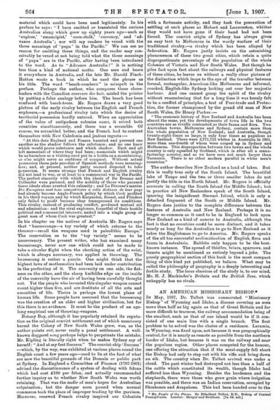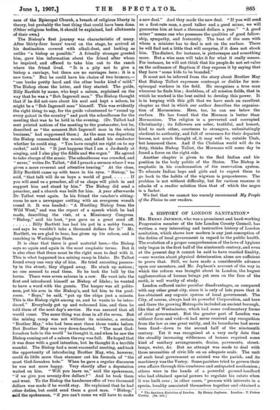AN AMERICAN MISSIONARY BISHOP.*
IN May. 1887, Dr. Talbot was consecrated "Missionary Bishop" of Wyoming and Idaho, a diocese covering an area more than half as big again as that of Great Britain and far more difficult to traverse, the railway accommodation being of the smallest, such as that of our island would be if it con- sisted of one main line with a single branch. The first problem to be solved was the choice of a residence. Laramie, in Wyoming, was fixed upon, not because it was geographically central, for it is nearly as remote as possible from the northern border of Idaho, but because it was on the railway and near the populous region. Other places competed for the honour, one offering the attraction that if the meat-supply fell short the Bishop had only to step out with his rifle and bring down an elk. The country when Dr. Talbot arrived was under a cloud. The past winter bad destroyed not less than a half of the cattle which constituted its wealth, though Idaho had suffered less than Wyoming. Besides the herdemen and the shepherds, there were those who grew grain where irrigation was possible, and there was an Indian reservation, occupied by Shoshones and Arapahoes. This had been banded over to the renntivPLV If.otlof iltrpopryaldtigolfgra". 833.1kili shop a Central
care of the Episcopal Church, a breach of religious liberty in theory, but probably the best thing that could have been done. (Other religious bodies, it should be explained, had allotments of their own.) The Bishop's first journey was characteristic of many. After thirty-four hours' travel on the stage, he arrived at his destination covered with alkali-dust, and looking as unlike "a bishop as possible." A friendly stranger greeted him, gave him information about the friend after whom he inquired, and offered to take him out to the ranch where the friend lived. "It is a pity not to give a bishop a carriage, but there are no carriages here, it is a new town." But he could have his choice of two broncos,— " one bucks pretty hard and the other bucks kind o' mild." The Bishop chose the litter, and they started. The guide, Billy Bartlett by name, who kept a saloon, explained on the way that he was a "Bob Ingersoll man." The Bishop thought that if he did not care about his soul and kept a saloon, he might be a "Bob Ingersoll man" himself. This was evidently the right thing to say, for the guide volunteered to "round up every galoot in the country" and pack the schoolhouse for the meeting that was to be held in the evening. (Dr. Talbot had sent printed notices of the meeting to the postmaster, but he, described as "the meanest Bob Ingersoll man in the whole business," had suppressed them.) As the man was departing the Bishop remembered the music, and asked his conductor whether he could sing. "You have caught me right on to my racket," said he. "It just happens that I am a Jo-dandy at singing, and I also play the fiddle and She organ." He agreed to take charge of the music. The schoolhouse was crowded, and "never," writes Dr. Talbot, "did I preach a sermon where I was given a more reverent and attentive hearing." At the close, Billy Bartlett came up with tears in his eyes. "Bishop," he said, "that talk will do us boys a world of good If you will send us a preacher, all of us chaps will pitch in and support him and stand by him." The Bishop did send a preacher, and a church was built for him. A year afterwards Dr. Talbot went again. In his friend the rancher's sitting. room he saw a newspaper cutting with an evergreen wreath round it. It was headed "A Hustling Bishop from the Wild West," and was the report of a speech which he had made, describing the visit, at a Missionary Congress. "Bishop," said his host, "you gave us a great send off.
Billy Bartlett has had his put in a nobby frame, and says he wouldn't like a thousand dollars for it." Mr. Bartlett, we are glad to hear, has given up his saloon, and is ranching in Washington State.
It is clear that there is good material here,—the Bishop says so again and again in the most emphatic terms. But it is also clear that there must be the right man to deal with it. This is what happened in a mining camp in Idaho. Dr. Talbot found every one very shy of him. He tried accosting passers- by in the street; they slipped away. He stuck up notices ; no one seemed to read them. So he took the bull by the horns. There were seven saloons in a row. He went into the first and introduced himself as Bishop of Idaho; be wanted to have a word with the guests. The keeper was all polite- ness, put his arm in the Bishop's, and led him to the pool- room. "Boys," he said, "put up the chips just a minute. This is the Bishop right among us, and lie wants to be intro- duced." Everybody got up and welcomed him, and then he told them of the next day's service. He was assured that all would come. The same thing was done in all the seven. But the mining camp was not without its minister, a certain "Brother May," who had been sent there three weeks before. But Brother May was very down-hearted. "The most God- forsaken hole in the world he thought it, and when he saw the Bishop coming out of a saloon the cup was full. He hoped that it was done with a good intention, but he thought it a terrible scandal. The Bishop bad a most successful meeting, and took the opportunity of introducing Brother May, who, however, could do little more than stammer out his formula of "the most God-forsaken hole." When he gave a regular discourse he was not more happy. Very shortly after a deputation waited on him. "Will you leave us." said the spokesman, " if we give you seventy-five dollars " And he took them and went. To the Bishop the handsome offer of two thousand dollars was made if he would stay. He explained that he had other duties, but could send them a good man. "Bishop," said the spokesman, "if you can't come we will have to make
a new deal." And they made the new deal. "If you will send us a first-rate man, a good talker and a good mixer, we will guarantee him at least a thousand dollars a year." "A good mixer" means one who possesses the qualities of good fellow- ship, sympathy, and fraternity. The best of the men with whom a minister has to deal is not on the surface. There he will find not a little that will surprise, if it does not shock him. The dialect, for instance, is picturesque and something more. But a wise man will take it for what it really means. For instance, he will not think that his people do not set value on the ordinance of Baptism if they express it by saying that they have "some kids to be branded."
It must not be inferred from the story about Brother May that Bishop Talbot expresses contempt or dislike for non. episcopal workers in the field. He recognises a true man wherever he finds him ; doubtless, of all mission fields, that in which he worked is the best suited to develop this power. It is in keeping with this gift that we have such an excellent chapter as that in which our author describes the organisa- tion of Mormonism. Here, too, he can see below the surface. He has found that the Mormon is better than Mormonism. The religion is a perverted and corrupted Christianity ; its followers are sober, truthful, and honest, kind to each other, courteous to strangers, unhesitatingly obedient to authority, and full of reverence for their departed heroes, not much thought of, it may well be, outside Utah, but honoured there. And if the Christian world will do its duty, thinks Bishop Talbot, the Mormons will some day be found a force on the right side.
Another chapter is given to the Red Indian and his position in the body politic of the States. The Bishop is emphatic in his condemnation of the reservation system. To educate Indian boys and girls and to expect them to go back to the habits of the wigwam is preposterous. The problem is not without difficulty, but for various reasons it admits of a readier solution than that of which the negro is a factor.
We feel that we cannot too warmly recommend My People of the Plains to our readers.







































 Previous page
Previous page